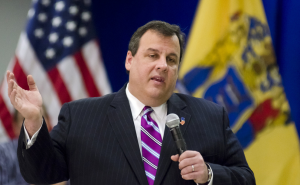It Depends on What the Meaning of the Word ‘Responsible’ Is
 If that title reminds you of a Bill Clintonism, that’s no accident.
If that title reminds you of a Bill Clintonism, that’s no accident.
New Jersey Governor Chris Christie today joined Mr. Clinton as a recipient of the PTSA (Politicians’ Tortured Syntax Award). But in Christie’s case, we’re not being educated about existential issues – rather, it’s about what we mean when we say we’re responsible.
Christie declared himself “responsible” for some bad things that happened under his watch – all the while making very clear that he himself never did and never would condone such things, never knew or approved of them, etc.
In fact, he was shocked–shocked! – to find that such things had been going on.
When Christie says “I’m responsible,” he is relying on our being confused about what that word means (and like all good deceivers, he probably suffers from the same confusion himself).
What he is trying to sound like is more like what we mean by “accountability.”
Meaning: the buck stops here, at the end of the day they all report to me, it happened on my watch. All these are ways of saying the Guy in Charge must suffer the occasional betrayal from his underlings, but he himself is noble, and grievously wounded by these terrible doings from the disloyal dogs in whom he had misplaced his trust.
Other examples? We heard the same thing from Rupert Murdoch. Ronald Reagan was famed for saying ‘mistakes were made.’ Jamie Dimon recently lamented the London Whale who cost JPMorgan so many billions. And we’re often suckers for that line, because we confuse the meaning with something else.
The Real Meaning of Responsibility
The other meaning of responsibility is not “accountability,” but direct, causal linkage. For example:
Q. Who was responsible for hiring these lying and conniving aides?
A. Chris ChristieQ. Who was responsible for delegating considerable authority to these lying and conniving aides?
A. Chris ChristieQ. Who was responsible for believing and backing these lying and conniving aides when they were questioned?
A. Chris ChristieQ. Who was responsible for creating a culture which tolerated or encouraged such venal behavior?
A. Chris Christie
This is the meaning of the word “responsibility” that CEOs and politicians need to be held to. Not whether they were personally culpable, but whether they created the reality in which these things happened. Notwithstanding the smoke they want to throw in our eyes about personal guilt.
Peter O’Toole died recently. One of his memorable roles was as Henry II in the film Becket. When held to high standards by the troublesome Archbishop Thomas a Becket, Henry cried out to a group of his knights, “Will no one rid me of this troublesome monk?” The men got the hint. Becket was killed – and Henry had what diplomats delicately refer to as “plausible deniability.”
Christie is trying to claim plausible deniability on the grounds that he didn’t do the deed. He shouldn’t be allowed to get away with it, anymore than Richard Nixon was.
Nixon famously said, “I am not a crook.” That was not the point for Nixon, not the point for Henry, not the point for Murdoch, or Dimon, and not the point for Christie. The point is – who designed the organization in which these things “happened” to happen.
That is “responsibility.” It’s a rare commodity these days.

Let’s note the Classist uses of the term. The unprivileged….the poor, kids, workers…must be held responsible for their lack of success, poverty, poor health, homelessness. Our privileged classes, no. Cf. the obligation to obey the law. Again, a poor woman’s obligation. (By “poor” is meant a person unable to pay for Sullivan & Cromwell’s services).
So, we have finally found a generosity of spirit in our elites: their willingness to forgive themselves, overlook the bad act of the day, and look forward, not back. After all, only they can “afford” their irresponsibility, as we all pay for it.
I read once about the three criteria for responsibility. It stuck with me.
1) ownership – that it is truly your and only your issue.
2) resources – the “ability” to respond.
3) that you are in a position to do something about the issue.
1) presupposes an issue
2) and 3) presuppose a need to respond
All three criteria exist before action.
Blame is not responsibility. It is armchair quarterback, hindsight thinking.
Failure to execute falls into that category. This is after the fact, throw the first stone, thinking.
That author set the three criteria as the yardstick to be used to measure “real” responsibility. Everything else is judgement.
Good criteria, I like those…